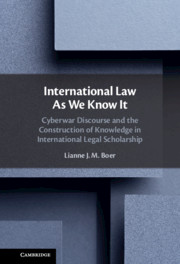 International Law As We Know It
International Law As We Know It Book contents
- International Law As We Know It
- International Law As We Know It
- Copyright page
- Contents
- Acknowledgments
- 1 Knowing International Law
- 2 “Legal Problem-Solution” and the Cyberwar Discourse
- 3 “Not ‘Armed Force’ in the Literal Sense”
- 4 “The Greater Part of Jurisconsults”
- 5 “Call Me Again If You’re Ever Ready to Begin Answering the Questions”
- 6 In Conclusion: International Law As We Know It
- Appendix Chapter 5
- Bibliography
- Index
4 - “The Greater Part of Jurisconsults”
Published online by Cambridge University Press: 01 October 2021
- International Law As We Know It
- International Law As We Know It
- Copyright page
- Contents
- Acknowledgments
- 1 Knowing International Law
- 2 “Legal Problem-Solution” and the Cyberwar Discourse
- 3 “Not ‘Armed Force’ in the Literal Sense”
- 4 “The Greater Part of Jurisconsults”
- 5 “Call Me Again If You’re Ever Ready to Begin Answering the Questions”
- 6 In Conclusion: International Law As We Know It
- Appendix Chapter 5
- Bibliography
- Index
Summary
This chapter takes a step closer to legal writing on Article 2(4) and cyberattacks, and considers the use of consensus claims: specifically, claims that there is 'general acceptance' of, 'unanimity' on, or 'a majority view' with regard to the meaning of the prohibition as armed force. It asks what is invoked when these kinds of claims are made, and seeks to account for what consensus claims signify in legal writing. The chapter then proceeds by looking at the footnotes following these claims. The ‘sources’ these footnotes list seemingly function to substantiate the consensus claim. However, as shown in the chapter appendix, in order to support their consensus claims scholars largely refer to the same publicists. Using the notion of “concept symbols” as coined by Henry Small, the chapter seeks to account for the function of these references to the most-cited scholars, and how they turn into the bearers of majority opinion. The chapter concludes that even though one single reference can appear to be quite innocuous, when considered as a more widespread practice it seriously impacts who gets a say – and thus, ultimately, what we know – in international law.
- Type
- Chapter
- Information
- International Law As We Know ItCyberwar Discourse and the Construction of Knowledge in International Legal Scholarship, pp. 97 - 126Publisher: Cambridge University PressPrint publication year: 2021
